These Olympic Facts for KS2 Children and Teachers are great for helping your class learn about the Olympics for themselves...and to help you brush up on your own Olympic knowledge!
When did the Olympics start?
The first official modern Olympic Games began on 6th April 1896. However, the history of the Olympics goes back much further than that!
The very first Olympics were held more than 2,700 years ago in ancient Greece. The ancient Greeks loved sports, and a sporting festival was held every four years to honour the god Zeus. People came from all over Greece to watch and to take part. The ancient Olympics continued until the year 393. By this time, the Romans had long since invaded ancient Greece and the games had continued under Roman rule. However, the Christian emperor Theodosius I ordered the games to be cancelled in 393 because he wanted to cancel all pagan events.
What were the ancient Olympic Games like?
Only free men were allowed to take part in the ancient Olympics; women couldn’t take part or even watch the games. They competed in events such as running, long jump, javelin, shot put, boxing and chariot racing.
The ancient Olympic Games could be quite brutal – athletes were often seriously injured or even killed. One of the most dangerous sports was pankration which was a type of martial art that combined wrestling and boxing. The only rules were that you were not allowed to bite or gouge your competitor.
Did you know…?
All athletes at the ancient Olympic games competed naked!
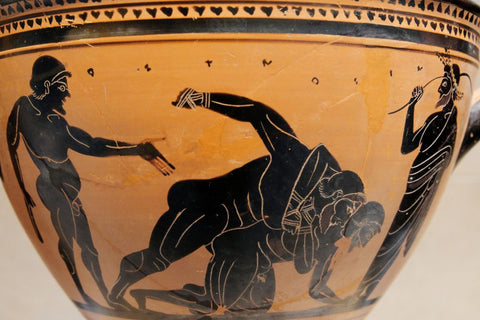
What was the first modern Olympic Games like?
The first modern Olympic Games was held in Athens, Greece in 1896. 214 athletes (all men) from 14 different countries came to compete in 43 different events.
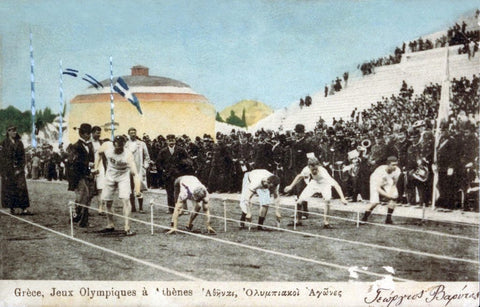
How often do the Olympics take place?
The Olympics take place every four years. Today, the Summer and Winter Olympics are staggered so that they take place two years after each other in a rolling cycle.
When were women first permitted to take part in the Olympics?
The first Olympic Games to allow women was the 1900 Games in Paris. Hélène de Pourtalès became the first woman to compete and the first female champion, winning a sailing event.
Since the 1900 Olympic Games, more and more women started competing, and more and more events for women’s sports have been added.
What events are there at the Olympic Games?
In the 2020 Olympics, there were 33 main sports for people to compete in, with a total of 339 events within these sports. Sports range from archery to artistic swimming and rowing to rugby. The 2020 Olympics included five new sports for people to take part in: baseball, karate, skateboarding, surfing and sport climbing.
In the 2024 Olympics there will be 32 main sports, with a total of 329 medal events. Karate, baseball and softball are not returning from the 2020 Olympics. However skateboarding, surfing and sport climbing have all been added.
How many people part in the Olympics?
The number of athletes changes from year to year. In 2020 more than 11,000 athletes took part in the Olympics. These 11,000 people came from 206 different countries.
In the number of athletes taking part in the 2024 Olympics is expected to be slightly lower than the 2020 Olympics, with around 10,500 people from 206 countries competing.
Who is the most successful Olympic athlete?
American swimmer Michael Phelps is the most successful Olympic athlete of all time. He has won an astonishing 23 gold medals, 3 silver medals and 2 bronze medals.
The next most successful athlete is gymnast Larisa Latynina from the Soviet Union. She has won 9 gold medals, 5 silver medals and 4 bronze medals.
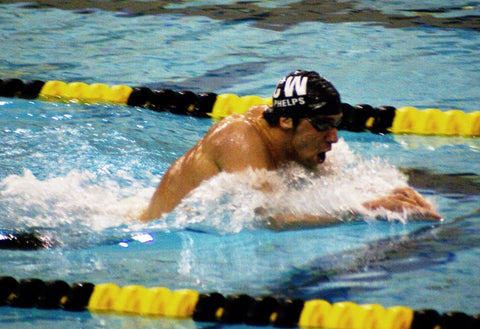
Who runs the Olympics?
The Olympics is run by the International Olympic Committee (IOC) which is based in Lausanne, Switzerland. It was founded in 1894 and is responsible for organising both the Summer and the Winter Olympic Games.
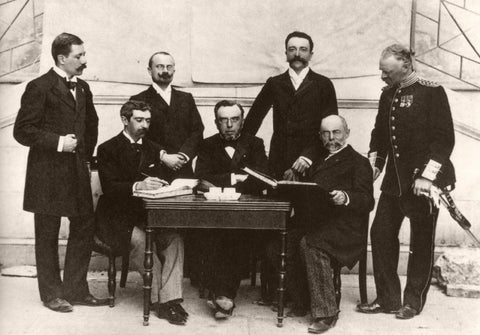
Who decides where the Olympics take place?
If a city wants to host the Olympic Games, they make a bid to the IOC. Now that the Olympic Games is such a big event, there are lots of things to take into consideration:
- The city needs to prove that it is big enough to handle the Olympics since lots of tourists, journalists and athletes will be in the city
- It needs to show that it has a good enough transport system in place
- It needs to show that enough security will be provided for both the athletes, the tourists and the residents of the city
- It has to show that it has all the different sporting venues it will need, such as swimming pools, tennis courts and outside areas for sports such as rowing and kayaking
- It needs to make sure that it can afford to host the Olympics - this sometimes involves raising taxes for the residents of the host country
There is a hefty fee to apply to become an Olympic host (the equivalent of around £120,000) and the city is usually chosen seven years before the Games begin so that it has plenty of time to prepare.
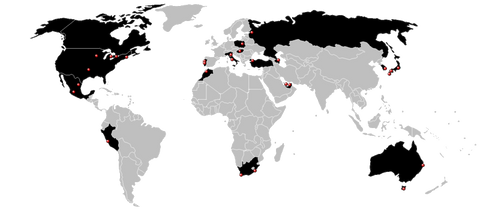
What do the rings on the Olympic flag represent?
The Olympic flag was designed in 1913 by Pierre de Coubertin. There are five coloured rings on the flag on a white background. These five rings represent the five continents of the world: Europe, Asia, Africa, America and Australia. At the time the flag was designed, the six colours of the flag (white, blue, yellow, black, green and red) supposedly included the colours of every competing nation’s national flag.
... the six colours [including the flag's white background] combined in this way reproduce the colours of every country without exception. The blue and yellow of Sweden, the blue and white of Greece, the tricolour flags of France, United Kingdom, the United States, Germany, Belgium, Italy and Hungary, and the yellow and red of Spain are included, as are the innovative flags of Brazil and Australia, and those of ancient Japan and modern China. This, truly, is an international emblem. -Pierre de Coubertin
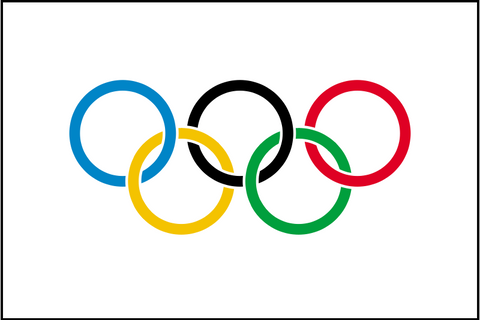
What is the Olympic flame?
The Olympic flame is a symbol that is used every year as a link between the ancient and modern Olympic Games. A few months before the Games start, the flame is lit at Olympia in Greece. The Olympic torch relay then takes place, which involves lots of different athletes carrying the torch closer and closer to the location of the Games.
This relay then ends during the opening ceremony of the Olympics when the torch is used to light the Olympic cauldron. It stays alight until the closing ceremony.
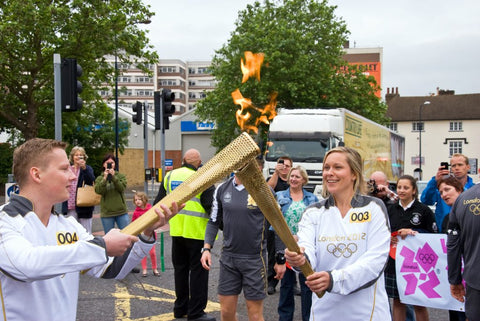
What are the Winter Olympics?
The Winter Olympic Games is an event much like the Summer Olympics but it is for sports that are practised on snow and ice. The first Winter Olympics took place in 1924. Events at the Winter Olympics include skiing, figure skating, curling, ice hockey and ski jumping.
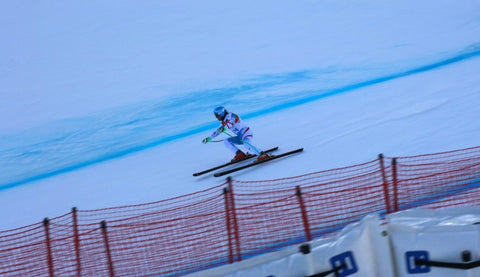
What are the Paralympics?
The Paralympic Games are a series of events involving athletes with a range of disabilities. This event first took place in 1948 for disabled war veterans.
The first official Paralympic Games took place in Rome in 1960. This involved 400 athletes from 23 countries. Since then, the Paralympic Games have taken place in the same year as the Summer Olympics.
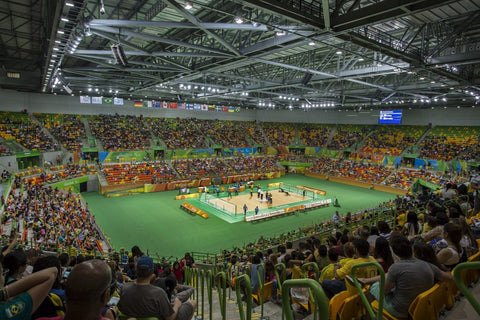
Fascinating Olympic facts:
- The Olympic gold medal is actually made mostly from silver!
- The modern Olympic Games have only ever been cancelled three times since their start in 1896. This was in 1916 due to World War I, and 1940 and 1944 due to World War II.
- Greece, Great Britain, France, Switzerland and Australia are the only five countries to have been represented at every Olympic Games since 1896.
- The youngest ever Olympic athlete to take part in the Games was Greek gymnast Dimitrios Loundras who was just ten years old when he competed in 1896. Today, different sports have different age limits but the very minimum is 16 years old.
- The official languages of the Olympic Games are English and French.
- The Olympic flame is lit using the traditional method of mirrors and the sun’s rays.
- The 2016 Rio de Janeiro Olympic Games marked the first time the Olympics had taken place in South America.
- In 1960, Abebe Bikila became the first African athlete to win a gold medal, and he did so by running a marathon barefoot!
- London holds the record for being the only city to host the Olympics three times – in 1908, 1948 and 2012.
- Women who were caught watching the ancient Olympic Games were thrown off a cliff!







